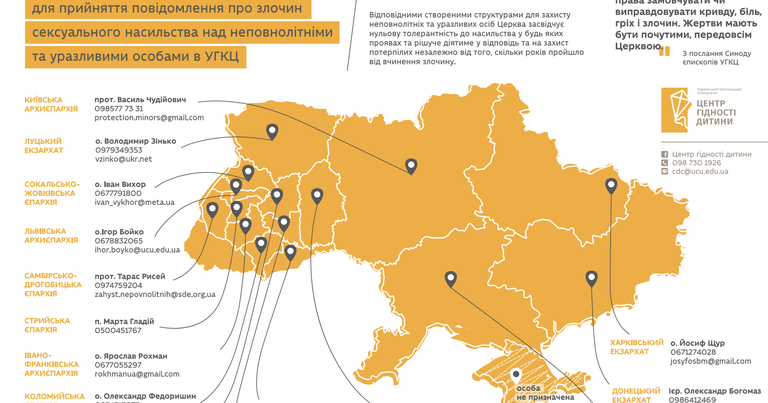"What are children silent about?" - a series of conversations about the needs of children from two sides: psychology and spirituality
As part of the Child Friendly Church project, UCU's Center for Child Dignity initiated a series of conversations "What are children silent about?" with child psychiatrist and psychotherapist Yuliana Maslak and Father Roman Demush, deputy head of the Patriarchal Commission on Youth of the UGCC. During the live broadcasts, they discussed the basic psychological needs of children from two perspectives: psychology and spirituality. How to satisfy them in an environmentally friendly way, how to be a sensitive and trusting adult, and how, given these topics, the church can be child-friendly.
Every child grows up with many needs. Some needs are expressed directly by the child, others are evidenced by the way he or she behaves, and some, due to age, remain unexpressed.
We adults need to know these needs, read them, and respond by creating a child-friendly environment.
The basic psychological needs that have been discussed:
- safe attachment to others (safety, stability, care and acceptance)
- autonomy, competence
- realistic boundaries, limits and self-control
- freedom to express needs and emotions
- the need for spontaneity and play
If the need for secure attachment to others has been satisfied, the child is convinced that the world is safe, he or she can trust others, and understands his or her value and importance. Satisfaction of this need influences the building of safe relationships in adult life. The church is a community where there is a place for everyone, a home that welcomes everyone. Children can sometimes be bored in the service because they do not fully understand what is happening, because their attention is not focused
As the child grows, so do his or her needs.
The second need is autonomy, competence. Exploring the world is incredibly important for children, as they need to get to know many things. Parents should reinforce attempts to do something, praise them for their efforts, so that they develop confidence that the child is capable of something. In adulthood, this will affect the child's sense of competence. Our path to God is an ascent. And on this path, the Creator allows us to make mistakes; the pedagogy of the Holy Sacraments says that God always forgives. Therefore, it is important not to approach a child's mistakes or pranks with statements that you shouldn't do that, because God will punish you. After all, God is loving, not punishing. Christianity is a religion of relationships. The God of mercy gives us a chance to make mistakes and grow over ourselves, taking into account these mistakes. That is why we should be patient and tolerant of children, of their knowledge of the world, of their imperfect behavior at home, in public places, and in the church.
The third need is realistic boundaries, limits, and self-control. Why is it so important to set boundaries? Because from an early age we learn to respect ourselves and others and build rules of interaction, and we feel safer when these rules are in place. A child learns to exercise self-control, to cope with impulses, emotions, and desires.
The preventive system of education of St. John Bosco is based on the development of the potential of goodness and reason that every child has, without coercion and pressure, on understanding, religion and love, without punishment. A child is inherently good, so it is better to protect and strengthen this natural goodness than to punish and then heal the wounds of improper upbringing, evil deeds, and spoilage. Hitting children is a sin. First of all, it is a loss of self-control in adults, a violation of their own boundaries and the child's personal boundaries. After all, adults are stronger, they should protect children, take care of their safety, and not commit violence. If parents have lost self-control, they must be aware that this is not the norm, so after they have regained control, they should talk to their child, explain the situation, and apologize. Leading by example is the best way to raise a child.
The fourth episode discussed the freedom to express needs and emotions. Children under a certain age are not able to control their emotions because the parts of the brain responsible for control mature later, by about 7-8 years. Children's pranks, disobedience, and excessive emotions are often perceived by adults as attempts at manipulation, but children express themselves in this way, and do not intentionally want to annoy and benefit from it.
Adults should be aware of the child's development, learn to negotiate, ask questions, and understand what the actual need is behind emotional manifestations. Acceptance means hearing about children's needs and trying to meet them, even if children signal these needs in a way that adults think is not very polite.
The fifth broadcast was about the need for spontaneity and play. Joy, movement, spontaneity, and play are very natural for children. The task of adults is to direct these needs in the right direction, not to let them go because it will lead to chaos, but to organize them. Spontaneity is about authenticity, so it is so important to allow children to show it. The church gives children the opportunity to satisfy their need for play and spontaneity. Participation in the nativity scene and caroling is a way to join in prayer in an interesting, interactive way. The Christmas holiday speaks in a special way about the dignity of the child - God came to people in the form of a child so that they could accept him.
Let us accept our children, take care of their needs, and let them and their dignity truly be an unconditional value.
You can watch all the broadcasts on the YouTube channel of the UCU Center for the Dignity of the Child:



